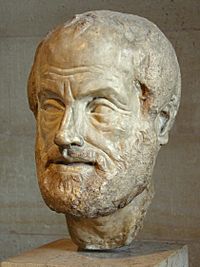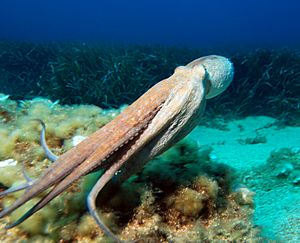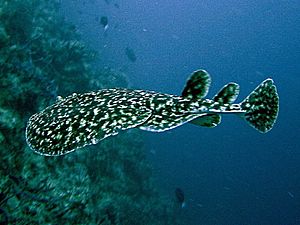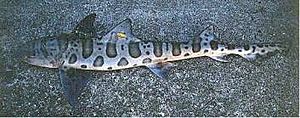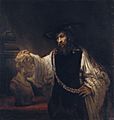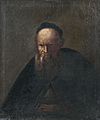Aristotle facts for kids
Aristotle (Stagira, Macedonia, 384 BC – Chalicis, Euboea, Greece, 7 March 322 BC) was a Greek philosopher. He was one of the most important philosophers in the history of Western civilization. It is said that Aristotle wrote many books, but only a much smaller number survive. Aristotle was the boyhood tutor of Alexander the Great, who later sent him plants and animals from parts of his new empire.
Contents
Life
Aristotle's father, Nicomachus, was a soldier of King Amyntas of Macedonia. From his eighteenth to his thirty-seventh year, Aristotle lived in Athens, as a metic and student of Plato.
At about the age of eighteen, he went to Athens to continue his education at Plato's Academy. Aristotle remained at the academy for nearly twenty years, not leaving until after Plato's death in 347 BC. He then traveled with Xenocrates to Asia Minor. While in Asia, Aristotle traveled with Theophrastus to the island of Lesbos, where they researched the botany and zoology of the island. Soon after Hermias' death, Aristotle was invited by Philip II of Macedon to become the tutor to his son Alexander the Great in 343 B.C.
Aristotle was appointed as the head of the royal academy of Macedon. During that time he gave lessons not only to Alexander, but also to two other future kings: Ptolemy and Cassander. Aristotle encouraged Alexander toward eastern conquest, and his attitude towards Persia was ethnocentric. In one famous example, he advises Alexander to be 'a leader to the Greeks and a despot to the barbarians, to look after the former as after friends and relatives, and to deal with the latter as with beasts or plants.
By 335 BC he had returned to Athens, starting his own school there known as the Lyceum. Aristotle taught courses at the school for the next twelve years. It is during this period in Athens from 335 to 323 when Aristotle is believed to have written many of his works. Aristotle wrote many dialogues, only fragments of which survived. The works that have survived are in fairly rough form. They are generally thought to be lecture notes for his students.
Aristotle's combined works constitute a virtual encyclopedia of Greek knowledge. It has been suggested that Aristotle was probably the last person to know everything there was to be known in his own time.
Near the end of Alexander's life, he began to suspect plots, and threatened Aristotle in letters. Aristotle was vocal about his dislike for Alexander's claim of divinity, and the king executed Aristotle's grandnephew Callisthenes as a traitor. Alexander died in Babylon in 323 without ever having returned to his native land. Upon Alexander's death, anti-Macedonian sentiment in Athens once again flared up, and Aristotle fled the city. However, he died in Euboea of natural causes that same year, 322 BC.
Philosophy
The three greatest ancient Greek philosophers were Aristotle, Plato, and Socrates. Socrates taught Plato, then Plato taught Aristotle. These three thinkers turned early Greek philosophy into the beginnings of Western philosophy as it is today. Aristotle taught Alexander the Great, who later conquered the entire Middle East.
Plato's main ideas were that knowledge from the senses was always confused and not pure. True knowledge can be gotten from the thinking soul that turns away from the world. Only the soul can have knowledge of "Forms", the real way things are. The world is only a copy of these "Forms" and is not perfect.
Aristotle thought differently. He thought that knowledge from the senses was more important. These thoughts became some of the roots of the scientific method after hundreds of years. Most of the things Aristotle wrote that we still have today are notes from his speaking and teaching. Some of his important writings are Physics, Metaphysics, (Nicomachean) Ethics, Politics, De Anima (On the Soul), and Poetics.
He also had problems with the atomic theory. He did not believe in Democritus' theories about the atomic theory. He believed that all matter was continuous whereas Democritus stated the all matter was made up of tiny indivisible things called "atoms". Democritus was proved right by physicist John Dalton in 1804.
Logic
Aristotle created a form of logic. His logic is called sentential logic because it uses sentences for the syllogism.
Aristotle's logic influenced the history of Western thought. It was Aristotle's logic which was copied and used in the Arabic and Latin mediaeval traditions. It was dominant for two and a half thousand years, until the late 19th century. Then modern logic was started by Gottlob Frege, Charles Sanders Peirce and others.
Biology
Aristotle is the earliest natural historian whose work has survived in some detail. He certainly did research on the natural history of Lesbos, and the surrounding seas and neighbouring areas. The works History of Animals, Generation of Animals and Parts of Animals have observations and interpretations, along with some myths and mistakes.
The most striking passages are about the sea-life round Lesbos. As well as live observation, he got specimens from the catches of fishermen. His observations on catfish, electric fish (Torpedo) and angler-fish are detailed. His writing on cephalopods such as Octopus, Sepia (cuttlefish) and the paper nautilus (Argonauta argo) are accurate. His description of the hectocotyl arm, used in sexual reproduction, was widely disbelieved until its rediscovery in the 19th century. He separated the aquatic mammals from fish, and knew that sharks and rays were part of the group he called Selachē (Selachimorpha).
Another good example of his methods comes from the Generation of Animals in which Aristotle describes breaking open fertilized chicken eggs at intervals to observe when visible organs were generated.
He gave accurate descriptions of ruminants' four-chambered fore-stomachs, and of the ovoviviparous egg development of the houndshark Mustelus mustelus.
The works
The works are traditionally listed in this sequence:
- Categories (terms)
- On Interpretation (propositions, truth)
- Prior Analytics (syllogistic logic)
- Posterior Analytics (scientific method)
- Topics (rules for argument and debate)
- On Sophistical Refutations (fallacies)
- Science and nature
- Physics (change, motion, void, time)
- On the Heavens (structure of heaven, earth, elements)
- On Generation and Corruption
- Meteorology (origin of comets, weather, disasters)
- The Parva Naturalia (psychological works)
- Sense and sensibilia (faculties, senses, mind, imagination)
- On Memory,
- Sleep, Dreams, and Prophesy
- Length of life
- Works on natural history
- History of Animals
- On the parts of Animals
- On the Movement of Animals
- On the Progression of Animals
- On the Generation of Animals
- Problems
- Philosophical works
- Metaphysics (substance, cause, form, potentiality)
- Nicomachean Ethics (soul, happiness, virtue, friendship)
- Eudemian Ethics, virtues & vices
- Politics (best states, utopias)
- Rhetoric (debate)
- Poetics (tragedy, epic poetry)
- The Constitution of the Athenians
- Fragments
Influence of Aristotle's work
Aristotle is still one of the most influential people who ever lived. He contributed to almost every kind of knowledge in his day, and he started many new fields.
- "It is doubtful whether any human being has ever known as much as he did".
Aristotle was the founder of formal logic, pioneered the study of zoology, and helped to develop scientific method.
Despite these achievements, Aristotle's errors are thought by some, such as Peter Medawar, to have held back science considerably. Bertrand Russell notes that "almost every serious intellectual advance has had to begin with an attack on some Aristotelian doctrine". Russell also refers to Aristotle's Ethics as "repulsive", and calls his logic "as definitely antiquated as Ptolemaic astronomy". Russell says these errors make it difficult to do historical justice to Aristotle, until one remembers what an advance he made on his predecessors.
The immediate influence of Aristotle's work was felt as the Lyceum grew into the Peripatetic school of philosophers. Aristotle's influence over Alexander the Great is seen in the latter's bringing with him, on his expedition, biologists and researchers.
Related pages
Images for kids
-
School of Aristotle in Mieza, Macedonia, Greece
-
Plato (left) and Aristotle in Raphael's 1509 fresco, The School of Athens. Aristotle holds his Nicomachean Ethics and gestures to the earth, representing his view in immanent realism, whilst Plato gestures to the heavens, indicating his Theory of Forms, and holds his Timaeus.
-
Aristotle noted that the ground level of the Aeolian islands changed before a volcanic eruption.
-
Among many pioneering zoological observations, Aristotle described the reproductive hectocotyl arm of the octopus (bottom left).
-
Aristotle proposed a three-part structure for souls of plants, animals, and humans, making humans unique in having all three types of soul.
-
The Blind Oedipus Commending his Children to the Gods (1784) by Bénigne Gagneraux. In his Poetics, Aristotle uses the tragedy Oedipus Tyrannus by Sophocles as an example of how the perfect tragedy should be structured, with a generally good protagonist who starts the play prosperous, but loses everything through some hamartia (fault).
-
Frontispiece to a 1644 version of Theophrastus's Historia Plantarum, originally written around 300 BC
-
William Harvey's De Motu Cordis, 1628, showed that the blood circulated, contrary to classical era thinking.
-
Nuremberg Chronicle anachronistically shows Aristotle in a medieval scholar's clothing. Ink and watercolour on paper, 1493
-
Aristotle by Justus van Gent. Oil on panel, c. 1476
-
Phyllis and Aristotle by Lucas Cranach the Elder. Oil on panel, 1530
-
Aristotle by Paolo Veronese, Biblioteka Marciana. Oil on canvas, 1560s
-
Aristotle by Jusepe de Ribera. Oil on canvas, 1637
-
Aristotle by Francesco Hayez. Oil on canvas, 1811
-
Relief of Aristotle and Plato by Luca della Robbia, Florence Cathedral, 1437–1439
-
Stone statue in niche, Gladstone's Library, Hawarden, Wales, 1899
See also
 In Spanish: Aristóteles para niños
In Spanish: Aristóteles para niños


